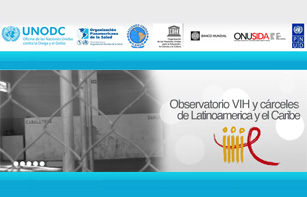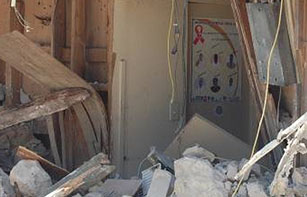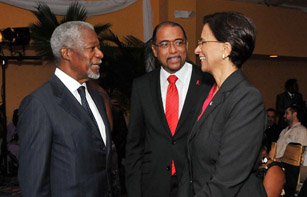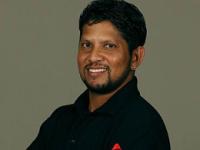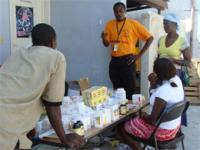
(L to R): UNAIDS Deputy Executive Director, Management and External Relations, Ms Jan Beagle; Hon Rodger Samuel, Minister in the Office of the Prime Minister responsible for HIV; Dr Ernest Massiah, Director, UNAIDS Caribbean; Mr Sam Condor, Deputy Prime Minister and Minister of Foreign Affairs of St Kitts and Nevis; Mr Ainsley Reid, GIPA, Jamaica; Ms Angelica Hunt, Ag UN Resident Coordinator; and Ms Izola Garcia, UNAIDS Coordinator for Trinidad and Tobago.
Representatives from government, civil society, people living with HIV, UN agencies and development partners from across the Caribbean met in Port of Spain, Trinidad and Tobago, to review progress made towards achieving universal access to HIV prevention, treatment, care and support targets. The two-day meeting held from 23-24 March was convened by UNAIDS in collaboration with partners in the lead up to the UN High Level Meeting on AIDS, which will take place in June 2011.
“This is a unique opportunity for everyone who is part of the AIDS response day after day to reflect and take stock of where we are on our shared journey,” said UNAIDS Deputy Executive Director, Management and External Relations, Jan Beagle.
Political leaders were candid about the challenges and underscored the need to engage young leaders and do things differently as the AIDS response enters a new era and moves towards reaching zero new infections, zero discrimination, and zero AIDS-related deaths.
“Fear, denial, ignorance, stigma and discrimination are still very prominent in the region. It is a barrier to condom use, even accessing HIV treatment and care,” said Rodger Samuel, Minister in the Office of the Prime Minister, Trinidad and Tobago. “The old approaches do not seem to be working, especially with the new generation. If we do not get our youth involved, ‘getting to zero’ will be an immensely hard task.”
There are an estimated 260 000 people living with HIV in the Caribbean. Close to half of people in need of antiretroviral treatment are receiving it. Overall, HIV now affects more women than men in the region. However, there is considerable variation between countries. For example, 60% of people living with HIV in the Bahamas are women. But in Cuba and Suriname, 69% of people living with HIV are men. AIDS remains the leading cause of death in people aged 20-59 years old.
Participants acknowledged important progress in the region to date, including a 43% reduction in AIDS-related mortality between 2001 and 2008, and an 18% reduction in new HIV infections among children during the same time period. There has been significant expansion of programmes to prevent mother-to-child HIV transmission of HIV, with four countries that reaching 95% coverage.
But stigma and discrimination, homophobia and a punitive legal environment continue to undermine efforts to reach universal access goals towards HIV prevention, treatment, care and support across the Caribbean. There are 11 countries in the region that criminalize sex between people of the same sex, and 13 that criminalize sex work. Five countries, territories and areas continue to impose restrictions on the entry, stay and residence of people living with HIV.
We must remove punitive laws that are blocking access to critical HIV services. The law should work for the HIV response, not against it
Ms Jan Beagle, UNAIDS Deputy Executive Director, Management and External Relations
“The HIV response shines a spotlight on inequality and violations of human rights, and compels us to act,” said Ms Beagle. “We must remove punitive laws that are blocking access to critical HIV services. The law should work for the HIV response, not against it.”
Participants also discussed the need to increase investment in stigma and discrimination reduction programmes to secure the rights of people living with HIV. Ainsley Reid, Coordinator for the Greater Involvement of People Living with HIV, Jamaica, underscored this by highlighting that “people living with HIV need more than medicines.”
“I know people who have died with the medicines in their hands. What we really need is social protection, including food, employment, housing, etc. This is what it takes to move beyond ‘victim mode’ and have empowerment and meaningful involvement,” he added.
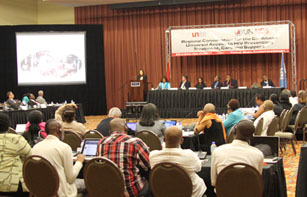
Participants during the universal access consultation that took place in Port of Spain, Trinidad and Tobago. 23-24 March 2011
Civil society reported on the outcomes and conclusions of a one-day meeting which they held prior to the universal access consultation. Representatives called for the removal of punitive laws that block HIV responses and violate human rights. The need for intensified political and community action to take on the continued taboo around issues related sexuality was also stated. Civil society also emphasized the need to train healthcare workers on ethics and confidentiality. A call was made for regional negotiations to drive down the price of medicines.
Changes in the development environment, including signs of reductions in funding flows, was a backdrop to the discussions during the two days. During the last decade the Caribbean region received more than US$ 1.3 billion in external funding for HIV. While some countries already fund their national HIV programmes entirely from domestic resources, others will be under increasing pressure to reduce programme delivery costs and secure new resources as current sources of funding decline.
“It will be imperative to clearly identify where we can make efficiencies in the region, and be ruthlessly honest about dropping what doesn’t yield us results,” said Ernest Massiah, Director of the UNAIDS Regional Support Team for the Caribbean in his remarks during the opening ceremony.





